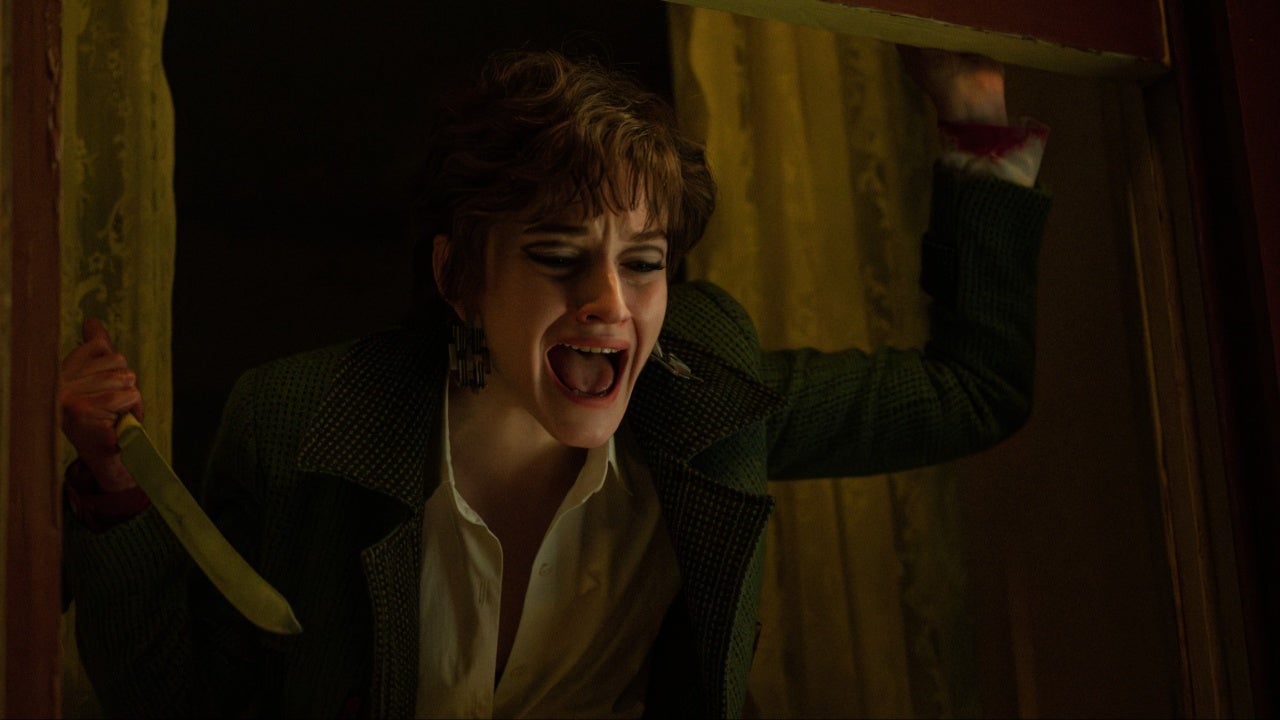Apartment 7A streams on Paramount+ beginning September 27. This review is based on a screening at Fantastic Fest 2024.
Apartment 7A is 2024’s third film about a young woman unwillingly impregnated by the devil, following Immaculate and The First Omen. The reason why this premise is so resonant at the moment should be obvious, given the devastating losses reproductive freedom has suffered in the United States in recent years. Women are being forced to carry pregnancies they don’t want, and some are dying in the process. Coercion, control, possession, infestation – in these movies, oppressive paranoia and body horror combine for a scenario that’s both terrifying and politically relevant.
The other two films in this mini trend received theatrical runs; the Rosemary’s Baby prequel Apartment 7A is going straight to streaming on Paramount+. That isn’t a statement on its perceived starpower – this follow-up to the granddaddy of the spawn-of-Satan subgenre has a pedigree that matches those of its peers – though it could speak to its level of quality. In a race with Immaculate and The First Omen, Apartment 7A glides right through the middle of the crowded pack.
Like The First Omen, Apartment 7A winds back the clock on a horror classic, telling the story of the woman who lived down the hall from friendly Manhattan Satanists Minnie (Dianne Wiest) and Roman Castevet (Kevin McNally) before Rosemary and Guy Woodhouse moved in. Although director Natalie Erika James makes her share of groan-worthy winks to the audience – a famous bassinet makes an appearance, albeit empty this time – she avoids showing any more than the back of a close-cropped blonde head when recasting the lead of Rosemary’s Baby. (In this way, it’s more tasteful than the most recent season of American Horror Story, but that’s a low bar to clear.)
Instead, James focuses on aspiring Broadway star Terry Gionoffrio (Julia Garner), who’s fresh off the bus from Nebraska when Apartment 7A begins. Although Terry is guarded, she’s also very naive – that’s the best way to justify the decisions she makes in this film, which include moving into a rent-free apartment offered to her by the Catevets after knowing them for only a day. They “don’t have children of their own,” they say, and so they want to help her – their choice of wording being one major red flag Terry blows right past.
Minnie and Roman and their building full of wealthy eccentrics are charming. Pivoting away from Ruth Gordon’s approach to the original film, Wiest dials up her character’s nasal New York accent and gregarious mannerisms. The result is a performance that’s grating at times, but always colorful. Garner, meanwhile, looks drawn and tired, expressing Terry’s skepticism and disappointment mostly through smirks and twitches of her wide mouth. Apartment 7A oscillates between theatrical and downbeat in its visuals as well, going for a colorful, Art Deco-inspired aesthetic in Terry’s stage performances and an overcast look everywhere else. Desperation is implied, as is ambition: Terry isn’t ready to give up and go home after an injury puts her on the sidelines, and she’ll do whatever it takes to make her dreams come true. But neither characteristic comes across very strongly. This is a film more concerned with hitting its marks (no pun intended) than tightening the paranoid net around its protagonist.
James poured on the metaphors in her 2020 feature debut, Relic, so it’s surprising that Apartment 7A so noticeably underplays its themes. The body horror is mild as well: We get a few nauseating cracking sounds when Terry breaks (and re-breaks) her foot on stage, but it never approaches the grotesque heights of Luca Guadagnino’s similarly dance-forward Suspiria remake. Instead, James opts for forceful, Bob Fosse-style choreography, combined with a bit of Busby Berkeley razzle-dazzle in a dream sequence (or is it?) where Terry hallucinates an assault (or does she?) by a demonic man covered in Swarovski-style crystals.
In a race with Immaculate and The First Omen, Apartment 7A glides right through the middle of the crowded pack.
One thing that Apartment 7A does get across is the sense of oppressive patriarchal menace that envelops Terry after she discovers she’s pregnant from what she believes to be a one-night stand with handsome stage director Alan Marchand (Jim Sturgess). The lack of options available to Terry, and the entitlement everyone around her assumes over her body and future once they find out about the pregnancy, is appropriate for the mid-1960s setting. But it also applies to large portions of the United States in 2024: Post-Roe anxiety is a major factor here, as it was in the year’s other pregnancy-horror films.
Apartment 7A comes close to a radical statement about women’s autonomy in its final stretch, where Terry considers her options as a young, unmarried woman who can either accept the “punishment” of single motherhood or make a literal deal with the devil. But the film’s hands are tied by the character’s ultimate fate in Rosemary’s Baby, which means that its gestures towards Satanic liberation have to stay just that – gestures. What’s left is a story that, while indifferently told, remains surprisingly – and depressingly – relevant more than 50 years on.












